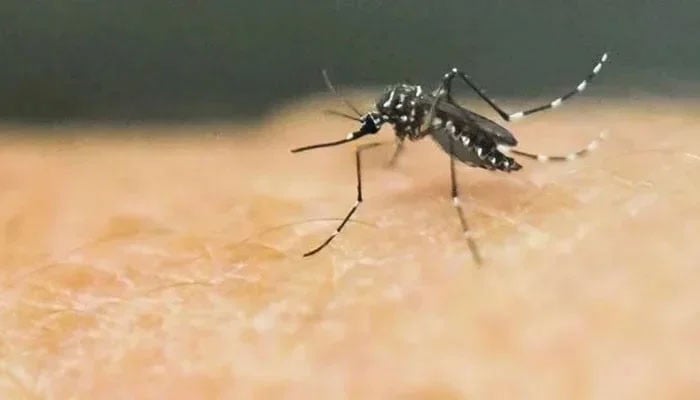ISLAMABAD: Zika virus has been confirmed in Pakistan for the first time, with researchers from the Aga Khan University (AKU) reporting laboratory evidence that Zika virus is present and circulating in the country.
Genetic testing shows the strain originated in Brazil in 2016 before spreading to the Americas.
The confirmation comes from a study published in the latest issue of the US Centers for Disease Control and Prevention’s journal Emerging Infectious Diseases, which investigated a mysterious dengue-like outbreak in Karachi in 2021.
At that time, hundreds of patients were reporting high fever, low platelet counts, rash, joint pain and other symptoms resembling dengue, yet repeatedly tested negative for the dengue NS1 antigen.
Alarmed by the unusual pattern, AKU’s infectious disease team, working with global collaborators, carried out advanced molecular testing and metagenomic sequencing on blood samples from symptomatic patients.
The results confirmed the co-circulation of dengue virus serotype 2 and Zika virus in Karachi, including cases where patients were infected with both viruses simultaneously.
Genetic sequencing revealed that the Zika strain in Karachi was more closely related to South American viruses than to strains found in neighbouring countries, indicating that it had been imported and adapted to local Aedes aegypti and Aedes albopictus mosquitoes — the same species responsible for transmitting dengue and chikungunya.
Researchers warned that Zika is likely an unrecognised contributor to the city’s recurring “dengue-like” outbreaks, as its symptoms are almost indistinguishable from other mosquito-borne viruses. They said the lack of testing means infections, particularly in pregnant women, could be going undetected, posing significant risks to newborns. First identified in Uganda in 1947, Zika virus usually causes mild illness or no symptoms in adults, with fever, rash, joint pain and conjunctivitis typically resolving within a week.
However, it can cause devastating effects in unborn children if contracted during pregnancy, including microcephaly, brain damage, vision and hearing problems, and developmental delays. During the 2015–2016 outbreak in Brazil, thousands of babies were born with severe birth defects linked to maternal Zika infection.
Scientific evidence suggests that up to 10-15 percent of infants born to mothers infected with Zika during pregnancy may suffer serious congenital complications, even if the mothers themselves had no obvious symptoms.
While the virus rarely causes death, its long-term impact on children and the strain on health and social care systems make it a serious public health threat. It can also be transmitted sexually, potentially allowing it to spread to areas without high mosquito populations.
In Pakistan, where dengue and chikungunya are already entrenched, the emergence of Zika adds a new layer of complexity to vector-borne disease control. Without routine screening, health workers may continue to misdiagnose Zika as dengue, leading to missed opportunities for intervention, especially in pregnancies.
The AKU researchers have urged health authorities to integrate Zika virus testing into the national arbovirus surveillance system and diagnostic protocols, particularly in high-risk urban areas like Karachi.
They also recommend targeted training for clinicians, especially those working in maternal and child health, to ensure febrile pregnant women are tested for Zika. Public health experts emphasise the need for integrated mosquito control measures, public awareness campaigns, and environmental monitoring of mosquitoes for Zika virus detection.
The confirmation of Zika virus in Pakistan marks a turning point in the country’s understanding of mosquito-borne diseases, suggesting that previous unexplained outbreaks may have involved undetected Zika cases.
Without immediate improvements in diagnostics, surveillance, and prevention efforts, the virus could silently persist, occasionally surfacing as clusters of preventable congenital disease. The AKU study serves as a clear warning that Pakistan’s fight against mosquito-borne illnesses has become more complex and demands an urgent, coordinated response.
